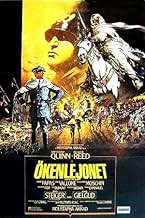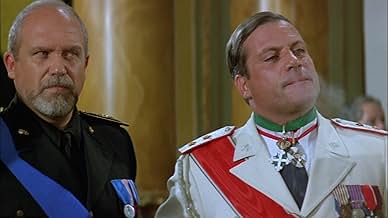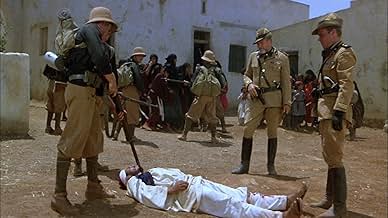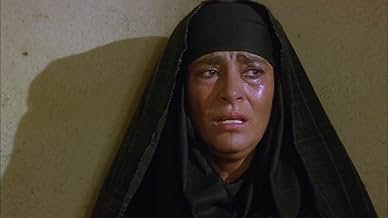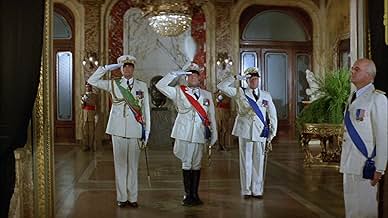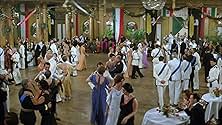Em 1929, Mussolini decide acabar com a resistência líbia à colonização italiana, liderada por Omar Mukhtar. Para isso, envia Rodolfo Graziani para África com uma missão simples: exterminar o... Ler tudoEm 1929, Mussolini decide acabar com a resistência líbia à colonização italiana, liderada por Omar Mukhtar. Para isso, envia Rodolfo Graziani para África com uma missão simples: exterminar os resistentes sem olhar a meios, e matar Mukhtar.Em 1929, Mussolini decide acabar com a resistência líbia à colonização italiana, liderada por Omar Mukhtar. Para isso, envia Rodolfo Graziani para África com uma missão simples: exterminar os resistentes sem olhar a meios, e matar Mukhtar.
- Direção
- Roteiristas
- Artistas
- Prince Amadeo
- (as Sky Dumont)
- Direção
- Roteiristas
- Elenco e equipe completos
- Produção, bilheteria e muito mais no IMDbPro
Avaliações em destaque
Anthony Quinn (somehow reprising his role in the epic "Lawrence of Arabia") portrays the Libyan Guerilla fighter "Omar Mukhtar" who pledged his (as well as his countrymen's) life to drive the invading Italian forces out.
The story depicts post World War 1, pre WW2 era where Benito Mussolini (played by Rod Steiger) tries carving up the globe with empires for Italy. He uses Libya as an "easy" stepping stone to the the Middle East (Libya's occupation was not started by him.. funny and demagogical enough the young Mussolini demonstrated against the occupation of Libya in 1911).
Mukhtar, the village teacher, on the other hand made this difficult and was so successful waging his campaign against the Italians, that Mussolini sends in his top general "The Butcher" Graziani, played deliciously by the late Sir Oliver Reed (the Trap 1966, The Four Musketeers 1974, Gladiator 2000 and many more) to straighten things out.
First, the Italians just "tour" Libya, raiding, burning, killing and raping... but when an entire attack convoy is completely wiped out by rebels, Graziani decides to wage an all-out war against Libyans. Graziani pretends to come to terms with Mukhtar, but, at the same time, brings thousands of fresh Italian troops to Tripoli and marches them inland. He is the first general to use planes and tanks in the desert, destroying town after town. This way he successfully corners Mukhtar and his rebels in the mountains.
Historically accurate, in its portrayal of the Italian army and of the campaign itself, Lion of the Desert is an action packed, nearly (I say nearly..) flawless epic war film.
Rod Steiger starts with some over-acting marching around his offices barking at people. But the film quickly shifts towards the vastness and splendor of the Sahara desert. It has excellent action sequences, that employ splendid special effects and lots of stunt work.
On top of this, it's one of the bloodiest war films I've seen, with bullet wounds spraying blood and people smashed to pulps by Italian tanks. God knows how this film faded away with a mediocre rating, but then again noone really saw the film right?
The film is also a fascinating portrayal of the Arabs way of life and how it conflicts with European ideals.
The musical score of this film, by Maurice Jarre (Lawrence of Arabia), is only great at times, but often seems uninspired and lame compared to his previous works on David Lean's great films.
The cinematography and editing are classy, (one con though.. the cameras seemed a little shy of hanging around close to the big gasoline truck explosion. The best scenes in the film are battle scenes, one involving a vast army of extras destroying a nearly helpless arab village, another with Graziani's army battling the Libyans for control of a mountain bridge. Other than those two, I can't say great about the 3 or so other battle scenes (compared to these two).The overall effect of battle senes is though quite satisfying.
The cast of this film, doesn't lack big-names like Irene Papas and Sir John Gielgud but the roles were inconsequential as Mukhtar's friends. Then, there's a lot of the old Italian B-movie stars in small roles as Italian soldiers and aides..
Akkad's strong point seems to be showing Italian artillery blowing the bewildered Bedouin warriors while his weak point seems to be spending the money. The film didn't really need the lavishness and authenticity of the picture. Do you really have to hire thousands of extras and build many many replica tanks just to go destroy them for the authenticy? No surprise this movie lost money, but the fact that it made almost no money astonishes me. Could be cause early 1980´s were wrong timing for an epic film. People watched "The Empire Strikes Back" and didn't want to see a thorough recreation of some war, most never heard of.
Lion of the Desert may not be perfect, but it's just as splendid a viewing as any of the old big-budget war films like Lawrence of Arabia and Doctor Zhivago, only this one's got a bit more action and politically ignored (as propoganda or is it the propoganda that endorses ignoring it??).
I highly recommend seeing the DVD in Widescreen, crisp quality and good 5.1 Dolby Digital sound, plus lots of informative extra features.
Not quite.
The film is no more anti-Italian than it is pro-Islam. That is to say it is neither. It's a grand scale film that shows a Facist state's attempt to colonize and reign over north Africa in the early half of the 20th century, and how the native populace waged a guerilla war against this effort. It does not cast aspersions on Italians, nor pushes Islam as a religion. Italy happens to be swept up in a facist mindset whose forces are at odds with a people who are predominantly Muslim.
Anthony Quinn himself states in the "Making of..." documentary that the lead character, Omar al-Mukhtar, was not fighting for Islam, nor proselytizing in any way. He was one of many guerilla leaders who was trying to push the facists out of Libya. And even then he's only trying to regain that which was taken by facists, and not so much force Italians themselves to leave. Facists who, at the time, happened to be from Italy. From what I've seen the film does its best to accurately depict what went on during Italy's expansionist period under Mussolini, and shows this episode of political and military contention between the two sides in Libya.
There's lots of good acting here, and grand battle scenes. The cinematography is the usual style for this sort of film. Unfortunately the cast was chosen more for their names to sell the film than anything else. Even so they, Quin, Reed, Steiger and the rest do a pretty good job of showing us how the men of the time acted and behaved, and Quinn does en exceptional job of showing a humble but resolved Mukhtar. The battle scenes, for the most part, are pretty good. There's one or two hammy performances by a couple of the supporting cast members, but they're overshadowed by the rest of the film.
The DVD transfer is OK. Anchor Bay's gone to some extra lengths to put some extra goodies on the disk, but the film's image could've used a dual layer process.
If you're a fan of military epics this film should entertain. A good watch.
Almost all aspects of movie making are amazingly rendered. It will easily compare with any movie about war and politics. The savagery, otherwise recorded only in books, is depicted marvelously. I want to praise a couple of actors but it would not be correct to leave anyone out so I am just saying that they were all tailor made for their roles. There is some real reel footage in the movie and that drives home the points raised in this movie.
On a tangent it is interesting that the so called civilized countries continuously plumbed new depths of uncivilized actions only for land and riches . It is an amazing display of imperialistic debauchery.
Você sabia?
- CuriosidadesThe production's obsession with authenticity extended right down to the same barber who used to shave Benito Mussolini's head being hired to shave Rod Steiger's, the actor who played him.
- Erros de gravaçãoMussolini is talking to Graziani in the opening when he looks the map of Libya, and says that all the green land is for Italy, but this is a topographical map that shows land greener as it becomes lower by sea level. Ninety percent of the area of Libya is desert.
- Citações
Omar Mukhtar: We will never surrender. We win or we die. And don't think it stops there. You will have the next generation to fight; and after the next, the next. As for me, I will live longer than my hangman.
- Versões alternativasThe U.S.A. Home Video VHS release in the '80s runs 160 minutes. Footage has been added in the Director's Cut released on Anchor Bay Video. This version, released in 1998, runs 206 minutes.
Principais escolhas
- How long is Lion of the Desert?Fornecido pela Alexa
Detalhes
Bilheteria
- Orçamento
- US$ 35.000.000 (estimativa)
- Tempo de duração2 horas 53 minutos
- Cor
- Mixagem de som
- Proporção
- 2.35 : 1
Contribua para esta página



